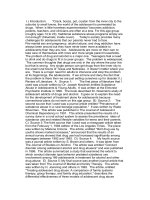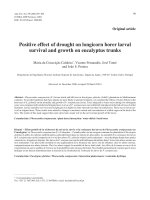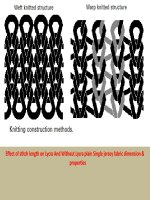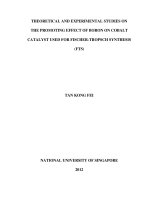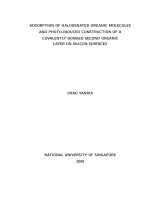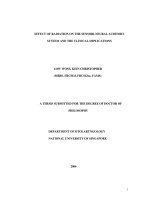Effect of organic fertilizer and microbial consortium on growth and quality parameters of gerbera cv. red gem and on soil health
Bạn đang xem bản rút gọn của tài liệu. Xem và tải ngay bản đầy đủ của tài liệu tại đây (224.47 KB, 6 trang )
Int.J.Curr.Microbiol.App.Sci (2019) 8(9): 1176-1181
International Journal of Current Microbiology and Applied Sciences
ISSN: 2319-7706 Volume 8 Number 09 (2019)
Journal homepage:
Original Research Article
/>
Effect of Organic Fertilizer and Microbial Consortium on Growth and
Quality Parameters of Gerbera Cv. Red gem and on Soil Health
Luna Barooah Madhumita* and Choudhury Talukdar
Department of Horticulture, Assam Agricultural University,
Jorhat-785013, Assam, India
*Corresponding author
ABSTRACT
Keywords
Biofertilizers,
groundwater,
organic flowers, soil
fertility
Article Info
Accepted:
14 August 2019
Available Online:
10 September 2019
A field study was conducted in the Experimental Farm, Department of
Horticulture, Assam Agricultural University, Jorhat for three years viz.,
during 2009-10, 2010-11 and 2011-12. The results of three years pooled
data of the experiment revealed that among the different treatments,
application of enrich compost@10t/ha (T2) significantly increases the
growth and flower characters followed by combination of enrich compost
@10t/ha + Biofertilizer (T4). Highest plant height (53.19 cm) stalk length
(56.50cm), days to full bloom (64.50), no of flowers/Plant (38.19), size of
flower (9.53cm), self life (21.98 days) vaselife (9.89days) no of suckers/
plant (16.69), benefit cost ratio (7.55) was recorded under treatment T2
followed by T4. Among soil parameters, MBC (18.86μg g-1 soil),
dehydrogenase (264.73 μg TPF g-1 soil), phosphomonoesterase (42.87 μg
p-nitophenol g-1 soil), fluorescein diacetate (5.42 μg fluorescein g-1 soil),
were found better in treatment treated with enriched compost@10t/ha.
Introduction
Gerbera (Gerbera gamesonii Bolus) is one of
the important commercial cut flower of the
world belongs to the family Asteraceae
(Compositae). It is native of South Africa and
is known as African daisy, Transvaal daisy
and Barbeton daisy. Gerbera can be grown in
open as well as in protected conditions.
Gerbera variety, Red Gem is found suitable
for cultivation in open field of Assam. For
successful cultivation nutrient management is
of prime importance to obtain good quality
flower. Organic flowers, according to many
people, are more fragrant and last longer than
non-organic ones.
The toxic inorganic chemicals used on flower
cultivation can poison groundwater and the
soil. Adaptation of organic cultivation
1176
Int.J.Curr.Microbiol.App.Sci (2019) 8(9): 1176-1181
practices for flower production increases the
product quality along with its benefits towards
a safer ecosystem.
Organic and biofertilizers are cost effective as
compared to chemical fertilizers and are
ecofriendly. Biofertilizers are the materials
which contain living micro organisms which
on application to soil mobilize the availability
of nutrients by their biological activity. They
also provide residual effect for subsequent
crops and help in recycling and decomposition
of organic matter. Biofertilizers increase crop
yield by 20-30%, improve quality of produce,
activate soil biologically and restore natural
soil fertility. Keeping these points in mind, the
present experiment was undertaken to find out
the effect of organic fertilizer and biofertilizer
on growth and quality parameters of gerbera.
DHD activities were determined by the
reduction of triphenyltetrazolium chloride
(TTC) to triphenylformazan (TPF) as
described by Casida et al., (1964) with
modifications. Tabatabi and Bremner (1969)
method is followed to estimate the
Phosphomonoesterase (PMEase) activity.
Results and Discussion
Growth and flowering parameters
Materials and Methods
The growth parameters showed significant
difference due to application of different bio
and organic fertilizers. The treatment T2:
Enrich compost @10t/ha has recorded highest
parameters like plant height (53.19 cm),
Number of leaves per plant(52nos), stalk
length(56.50 cm), suckers per plant(16.67 nos)
which was followed by T4: Enrich compost
@10t/ha + Biofertilizer.
The experiment was conducted for three years
viz., during 2009-10, 2010-11 and 2011-12.
The soil was sandy loam with PH of 4.90;
organic carbon content 0.64 per cent, available
N 0.07 per cent and available P2O5 and K2O
was 47.52 and 74.25 kg per hectare,
respectively. The experiment was laid out in
randomized block design with three
replications. The treatments include T1:
Optimal compost @10t/ha, T2: Enrich
compost @10t/ha, T3: Optimal compost
@10t/ha +Biofertilizer, T4: Enrich compost
@10t/ha + Biofertilizer, T5: Optimal compost
@5t/ha+Biofertilizer, T6: Enrich compost @
5t/ha+ Biofertilizer, T7: Biofertilizer and T8:
Control. Observations were recorded on plant
height, number of leaves, leaf area, and days
to first flower emergence, number of days to
full bloom, number of flowers, self life of
flowers and vase life of cut flowers. Soil
microbial biomass carbon (MBC) was
determined
using
the
chloroformfumigation- extraction method following
the method of Vance et al., (1987). The
Minimum was recorded in treatment (T0)
control as evident from table no.1. The
increase in growth parameters in the treatment
T2 is due to the beneficial effect of enriched
compost. This may due to increased
absorption of nutrients which resulted increase
in the synthesis of carbohydrates, hormones
activity produced by Azospirillum and PSB
which are present in enriched compost. PSB
might have increased phosphate availability in
the soils which in turn helped better
proliferation of root growth and helps to
uptake other nutrients. Similarly, flowering
parameters like number of flowers per plant
(38.19), size of flower (9.54 cm), self life
(21.98 days), vase life (9.89 days) were also
higher under T2 followed by T4. Lowest was
recorded under control (T0) respectively. The
treatment T2 recorded the lowest days to full
bloom (64.50 days) while highest days for full
bloom were recorded under T0. Similar
findings were reported by Raha (2015) where
the use of organic amendments enhanced the
growth and flowering of chrysanthemum.
1177
Int.J.Curr.Microbiol.App.Sci (2019) 8(9): 1176-1181
Table.1 Effect of organic and bio-fertilizer on growth characters of gerbera
(Pooled data over 3 years -2009-10, 2010-11, 2011-12)
Treatment
Plant height
(cm)
Stalk
length (cm)
40.90
No of
leaves/
plant
44.66
T1 (OC 10 t/ha)
Suckers /
plant
43.50
13.66
T2 (EC 10 t/ha)
53.19
52.00
56.50
16.67
T3 (T1+Biofet)
40.68
42.66
41.83
14.77
T4 (T2+Biofert)
50.77
49.00
51.00
14.99
T5 (OC 5
t/ha+Biofert)
T6 (EC 5
t/ha+Biofert)
T7 (Biofert)
39.60
37.66
41.50
13.33
41.26
44.33
42.00
14.11
38.65
37.66
40.83
12.33
T8 (Control)
37.28
33.66
38.00
11.89
CD 5 %
0.99
3.38
0.69
0.59
Table.2 Effect of bio-fertilizer on flowering of gerbera
(Pooled data over 3 years -2009-10, 2010-11, 2011-12)
Treatments
T1 (OC 10 t/ha)
T2 (EC 10 t/ha)
T3 (T1+Biofet)
T4 (T2+Biofert)
T5 (OC 5
t/ha+Biofert)
T6 (EC 5
t/ha+Biofert)
T7 (Biofert)
T8 (Control)
CD5%
Days to full
bloom
69.93
64.50
71.00
67.73
70.36
No. of
flower/ plant
24.92
38.19
25.50
36.88
27.05
Size of flower
(cm)
8.34
9.53
8.23
9.14
7.61
71.00
26.12
8.40
7.03
68.53
74.73
5.58
25.01
22.59
0.38
8.13
8.42
0.35
6.64
6.53
6.87
1178
Vase life
(Days)
6.87
9.89
7.28
8.67
7.63
Int.J.Curr.Microbiol.App.Sci (2019) 8(9): 1176-1181
Table.3 Effect on microbial population and soil health parameters
Treatments
MBC
-1
(µg g )
T1 (OC 10 t/ha)
T2 (EC 10 t/ha)
T3 (T1+Biofet)
T4 (T2+Biofert)
T5 (OC 5 t/ha+Biofert)
T6 (EC 5 t/ha+Biofert)
T7 (Biofert)
T8 (Control)
CD at 5%
436.84
498.86
415.14
472.91
326.05
362.22
289.42
244.06
12.67
Dehydrogenase
(µg TPF g-1
24h-1)
128.89
264.73
154.26
245.00
110.86
229.57
127.03
102.34
16.06
The induction of earliness was due to better
nutritional status of the soil which ultimately
increases the nutritional status of the plants.
Naik et al., (2006) reported that in gerbera,
greater leaf area, more number of leaves per
plant and plant spread increases which in turn
resulted in production of more number of
flowers.
Soil health parameters
Soil health parameters like microbial biomass
carbon, dehydrogenase activity was found
higher under T2 followed by T4. Enriched
compost resulted in the highest MBC (226.39
µg/g soil) than the control (99.44 µg/g soil).
This might be due to higher availability of
substrate as carbon from applied organic
source of nutrients which improved microbial
and enzymatic activities in soil (Rajkonwar,
2012). Increased microbial biomass resulting
from continuous organic matter enrichment in
soil, since addition of good quality compost
had a direct bearing on microbial biomass and
soil enzyme activities (Albiach et al., 2000).
Walia et al., 2004 also reported that microbial
biomass carbon was more with organic
farming treatment and showed higher activity
Phosphomonoesterase
(PMEase) activity (μg
p-nitrophenol g-1 soil
hour-1)
48.78
42.87
52.26
42.64
44.52
52.00
64.66
36.32
2.37
Fluorescein
Diacetate Hydrolysis
(FDA) activity (μg
fluorescein g-1 soil
hour-1)
4.8
5.42
6.39
6.43
5.53
5.72
7.58
8.57
0.82
of dehydrogenase and phosphatase activity.
The dehydrogenase activity in the present
study increased significantly in soils under
treatment T2 (270.70 μg TPF g-1 soil 24 hr-1).
Enrich compost may possibly provide
microbial diversity and activity of micro
organisms which in turn resulted better
dehydrogenase activity. Mukherjee et al.,
2002 stated that enriched compost nurtured
high population of bacteria, actinomycetes
fungi, non symbiotic N fixing bacteria and
PSB. Application of enriched compost
resulted significantly higher phosphomonoesterase activity (374.22 μg p-nitrophenol g–1
soil h–1). This may be due to release of more
organically bound P, as synthesis of enzyme is
stimulated by the presence of organic substrate
(Biswas
and
Narayanswamy,
2006).
Fluorescein di-acetate hydrolysis is showing
highest value in enriched compost (5.42 μg
fluorescein g–1 soil h–1). This could be
attributed to increased microbial biomass
resulting from continuous organic matter
enrichment in soil which has a beneficial
effect on microbial biomass and soil enzyme
activities. This is in conformity with Chang et
al., (2007). Highest PMEase activity of
1179
Int.J.Curr.Microbiol.App.Sci (2019) 8(9): 1176-1181
63.76μg p-nitrophenol g-1 soil hour-1 under
the soil treated with treatment T8 (Enriched
compost 5t ha-1). Rock phosphate carrying
enriched compost could have augmented the
available phosphate in the treatment. It may be
due to the release of more organically bound
phosphate as a result of synthesis of enzyme
which is stimulated by the presence of organic
substrate (Biswas and Narayanaswamy, 2006).
Sanwal et al., 2007 reported that application
of organic fertilizer not only produced higher
and sustainable crop yield, but also improved
soil fertility and productivity. Organic manure
has beneficial effect on physical, chemical and
biological characteristics of soil, which in turn
influences growth and productivity of plant
(Molla et al., 2005). Biswas et al., 2008
revealed that application of enrich compost
increases soil organic carbon content,
available N, P and K in soil.
From the above experiment, it was evident
that organic fertilizer and microbial
consortium had positive impact on yield,
quality of gerbera as well as on soil health.
Among the different treatments, T2 (Enriched
compost 10t ha-1) was found to be best.
References
Albiach, R., Canet, R., Pomares, F. and
Ingelmo, F. (2000). Microbial biomass
content and enzymatic activities after the
application of organic amendments to a
horticultural soil. Bioresour.Technol. 75
: 43-48.
Biswas, D. R. and Narayanasamy, G. (2006).
Rock phosphate enriched compost: An
approach to improve low grade Indian
rock phosphate. Bioresour. Technol. 97:
224351.
Casida, L E ; Klein D. A and Santoro, R
(1964): Soil dehydrogenase activity. Soil
Science: 98: 371-376
Chang, E., Chung, R. and Tsai, Y. (2007).
Effect of different application rates of
organic fertilizer on soil enzyme activity
and microbial population. Soil Sci. and
Pl. Nutri. 53(2): 132-140
Danish R; Srinivasan, V; Hamza, S and
Manjusha, A (2010). Short term
incorporation of organic manures and
biofertilizers influences biochemical and
microbial characters of soil. Biores
Technol. 101: 4697-4702
Molla, AH; Fakhrul Razi, A, Hanafi, M M ;
Alam, M. Z (2005). Compost produced
by solid state bio-conservation of
biosolids: A potential source for plant
growth and environment friendly
disposal. Commercial Soil Sci. Plant
Analysis 36: 1435-1444
Mukherjee, D; Das S; Saha N; Sahu, S. S;
Chakraborty,
A;
Halder,
M
;
Bhattacharyya K and Mukhopadhyay, N
(2002). Microbial changes during the
process of composting. In: International
Conference on managing natural
resources for sustainable agricultural
production in 21st Century Extd Sum 2:
712-714
Nath, R and Samanta, R(2012).Soil PH,
microbial population, nitrate reductase
and alkaline phosphatase activities of
different environment of dibrugarh
district, Assam. Adv. Appl Sci Res. 3(3):
1772-1775
Naik, B.H., N. Chauhan, A.A. Patil, V.S. Patil
and B.C. Patil. 2006. Comparative
performance of gerbera cultivars under
naturally ventilated polyhouse. Journal
of Ornamental Horticulture, 9: 204-207.
Raha, S. 2015. Studies on the effect of
vermicompost on the growth, yield and
quality
of
hrysanthemum
(Chrysanthemum coronarium L. cv.
Kasturba Gandhi). International Journal
of Environmental Science, 4(2): 68-71.
Rajkonwar, U. (2012). Assessment of organic
sources on microbial biomass and
nutrient availability in tea soil. M.Sc.
1180
Int.J.Curr.Microbiol.App.Sci (2019) 8(9): 1176-1181
(Agri.) Thesis. Assam Agricultural
University, Jorhat.
Sanwas, SK; Lakminarayana, K and Yadav
R.K ; Rai N; Yadav, D.S and Mousumi,
B(2007). Effect of organic manure on
soil fertility, growth, yield and quality of
turmeric. Ind. J.Hort. 64:444-449
Subhani, A., Changyong, H., Zhengmiao, X.,
Min, L. and El-Ghamry, A. M. (2001).
Impact of soil environment and
agronomic
practices
on
microbial/dehydrogenase
enzyme
activity in soil–A review. Pak. J. Biol.
Sci. 4 : 333-38.
Walia, S. S ; Kler, D. S ; Gill, M. S(2004).
Soil microflora as influenced by organic
and inorganic sources of nutrition in
maize wheat system. In: Proc. 2nd
National Symposium on Alternate
farming system held at Project
Directorate of cropping system research,
Modipuram, Meerut 16th to 18th
SeptemberPP:166-168
Vance, E D; Brookers, P. C and Jenkinson, D.
S (1987). An extraction method for
measuring soil microbial biomass
carbon. Soil Biology and Biochemistry
19: 703-707.
How to cite this article:
Luna Barooah Madhumita and Choudhury Talukdar 2019. Effect of Organic Fertilizer and
Microbial Consortium on Growth and Quality Parameters of Gerbera Cv. Red gem and on Soil
Health. Int.J.Curr.Microbiol.App.Sci. 8(09): 1176-1181.
doi: />
1181
